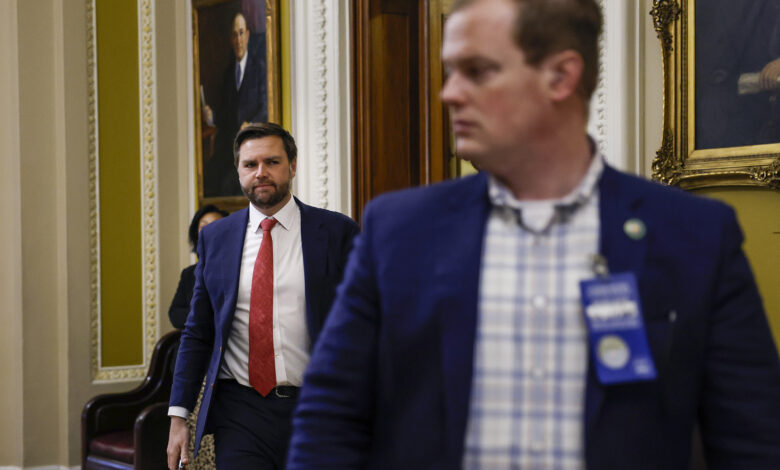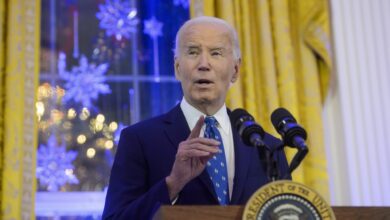Congress’ huge spending bill sneaks in a rescue for censors

Just when Congress seemed poised to strike a blow against the Censorship-Industrial Complex, its 11th-hour maneuvering may have snatched defeat from the jaws of free-speech victory.
Tucked into the 1,547-page continuing resolution now before Congress to fund the government into March is a section titled “Global Engagement Center Extension.”
If not struck, it will prolong the life of a key government censorship cog that had been ticketed for closure.
The State Department recently indicated its plans to shutter the GEC in a court filing.
The department’s announced plan to “realign” the GEC’s staff and funding to other “foreign information manipulation and interference activities” already gave free speech champions pause — but any Deep State concession would have been significant.
GEC was formed to counter foreign propaganda and disinformation campaigns.
But like other parts of the fed-led censorship apparatus, the interagency entity underwent civil rights-eviscerating mission creep, expanding its mandate to suppress the speech of Americans guilty of wrongthink.
The evidence of this emerged in Daily Wire v. State Department, whose plaintiffs allege that the GEC’s funding, promoting and marketing of internet “risk-raters” Global Disinformation Index and NewsGuard amounted to First Amendment-violating censorship-by-proxy.
These groups aim to purge purported mis- and disinformation by threatening the business models of outlets that publish news and views they deem illegitimate.
They do so by starving those outlets of vital ad revenue, placing them on de facto blacklists that companies use in determining where not to advertise, to protect “brand safety.”
Invariably, the risk-raters ding conservative and independent outlets due to subjective rating criteria and inherent biases, doing them great financial and reputational harm.
The New York Post has been ensnared in this wrongthink dragnet, as has RealClearPolitics, which presents commentary from both left and right.
As I testified to the House Small Business Committee in June, GEC’s funding and support of the risk-raters meant our government had effectively abridged freedom of speech and of the press — with our tax dollars, and via a foreign-facing entity.
The committee produced a report on government-backed censorship, indicating that GEC not only supported these media demonetizers but funded, “develop[ed], then promot[ed] tech start-ups . . . in the disinformation detection space to private sector entities with domestic censorship capabilities.”
GEC’s interference in domestic speech was also apparent in its role as an “external stakeholder” in the federal government’s Election Integrity Partnership, which played a role in censorship surrounding the 2020 election.
Under the EIP, a project pushed by the Department of Homeland Security, four government-tied NGOs lobbied social media platforms to suppress disfavored election-related speech.
The groups scoured hundreds of millions of social media posts to identify violative content, and flagged the offending speech to platforms like Facebook and Twitter for removal.
GEC was involved in that search effort, contributing some of the offending content that EIP conveyed to social media companies.
When “Twitter Files” journalists and others exposed the GEC’s efforts and drew congressional scrutiny, the State Department itself attacked GEC critics — issuing official press guidance to discredit now Sen.-elect Jim Banks (R-Ind.) and reporters Gabe Kaminsky and Matt Taibbi.
Under the law that first established it, GEC was set to go out of business at the end of this year.
The entity’s authorization was not renewed under the National Defense Authorization Act, the annual defense bill that passed the House on Dec. 11.
The State Department remained “hopeful that Congress extends this important mandate through other means,” a spokesperson told me.
Now, with the GEC’s extension baked into Congress’ last-minute funding bill, the department seems to have gotten its wish.
This chicanery makes President-elect Trump’s “Free Speech Policy Initiative” even more imperative.
Under that plan, he has vowed to bar federal agencies from colluding with censors and funding mis- or dis-information-labeling initiatives.
He’s also pledged to fire bureaucrats who have engaged in censorship and to defund third parties, including NGOs and universities, who have targeted disfavored speech.
Brendan Carr, Trump’s pick for FCC chairman, has said we must “dismantle the censorship cartel” and is probing NewsGuard’s efforts to that end.
Likewise Andrew Ferguson, Trump’s pick for FTC chairman: “If platforms or advertisers are colluding to suppress free speech in violation of the antitrust laws, the FTC must prosecute them and break up those cartels,” he has said.
The president-elect’s tabbing of two of the most prominent victims of the Censorship-Industrial Complex — Robert F. Kennedy Jr. and Dr. Jay Bhattacharya — to lead the public health agencies that targeted them further suggests sweeping change is coming.
“The fight for Free Speech is a matter of victory or death for America,” Trump has said.
If Congress won’t engage, the Trump administration must step into the breach to save our First Amendment.
Benjamin Weingarten is editor at large at RealClearInvestigations.




